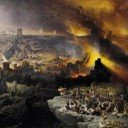The third seal continues the calling out of the horses and their riders. This time the horse is black and it’s rider is carrying a pair of scales.
Rev. 6:5-6 When he opened the third seal, I heard the third living creature say, “Come!” And I looked, and behold, a black horse! And its rider had a pair of scales in his hand. [6] And I heard what seemed to be a voice in the midst of the four living creatures, saying, “A quart of wheat for a denarius, and three quarts of barley for a denarius, and do not harm the oil and wine!”
With this horse you have the obvious result of war and civil disruption. In fact, one unique oddity of the Jewish Civil Wars and the resultant siege of the city by the Romans is that there was, at the very beginning, plenty of food in storage within the city. The warring factions “within” the city would actually damage the food supply out of sheer spite of their internal enemies. These foolish actions eventually led to acts of cannibalism as recorded by Josephus; even the eating of small children by their parents.
Even the color of the horse being related to famine can be directly traced to an Old Testament image…
Lam 5:10 Our skin was black like an oven because of the terrible famine.
Now considering what we know, it would once again prove a great benefit to look at Leviticus 26 and note what promised sevenfold punishments would impact the covenantally unfaithful apostate state of Israel. This even includes the necessity of measuring out the grains as represented by the scales.
Lev 26:26 When I break your supply of bread, ten women shall bake your bread in a single oven and shall dole out your bread again by weight, and you shall eat and not be satisfied. 27″But if in spite of this you will not listen to me, but walk contrary to me, 28then I will walk contrary to you in fury, and I myself will discipline you sevenfold for your sins. 29 You shall eat the flesh of your sons, and you shall eat the flesh of your daughters.
This was clearly fulfilled in the first century siege and destruction of Jerusalem. But also note the following promises of sevenfold judgment as they apply to the first two horses and riders as well. remember they listed as conquering king (with a crown) and one who brings war.
Lev 26:17 I will set my face against you, and you shall be struck down before your enemies. Those who hate you shall rule over you,
…25And I will bring a sword upon you, that shall execute vengeance for the covenant.
…31 And I will lay your cities waste and will make your sanctuaries desolate
…33And I will scatter you among the nations, and I will unsheathe the sword after you, and your land shall be a desolation, and your cities shall be a waste.
Deut 28:17 Cursed shall be your basket and your kneading bowl.
…25 “The LORD will cause you to be defeated before your enemies.
..36 “The LORD will bring you and your king whom you set over you to a nation that neither you nor your fathers have known.
These promised result of covenantal unfaithfulness see their fulfillment even in these first few seals. These promised are given as reminders to the apostate ones that they were given fair warning and that soon these promised judgments would be arriving. The same will be said of the following horse as we will see.
This promised horse and rider and the results they bring can also be clearly seen in the Olivet Discourse.
Matt 24:6 and there will be famines and earthquakes in various places.
Luke 21:11 There will be great earthquakes, and in various places famines
The Bible and history itself records these promises as they began to unfold…
- Acts 11 - records a great famine that took place during the time of Claudius - 44 AD
- “And famine did oppress them at that time, and many people died…” Josephus
- This year (51 AD) witnessed many prodigies; repeated earthquakes…shortage of corn, resulting in famine…” Tacitus
- “As the famine grew worse, the frenzy of the insurgents (Jewish zealots) grew worse.” Josephus
- “Many secretly bartered their possessions for wheat, or barley if they were poor…” Jospehus (see Rev 6:6)
- “In a single autumn, 30,000 deaths from plague were registered…” Seutonius
- “…mothers killed, roasted and ate their own children…” Chilton quoting Josephus
What is interesting is the command not to harm the oil and wine. This most obviously refers to the religious and Temple worship artifacts. The Romans actually did their best to avoid harming the temple and originally decided not to destroy it until the rebellion of the zealots got out of hand.
That call to the gentile war mongers not to destroy the religious artifacts was ignored, though, by the zealots themselves. Jospehpus writes of a Jewish zealot leader named John Gischala stole the sacred vessels that contained the wine and oil and distributed them amongst his men for consumption. This exemplified the horror of the famine and the lengths some would go to eat and sustain life in those circumstances.
The following post will look at the last of the four horsemen and the eventual result of the war.





No comments:
Post a Comment